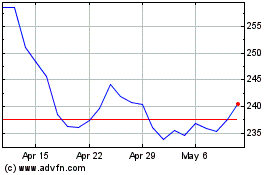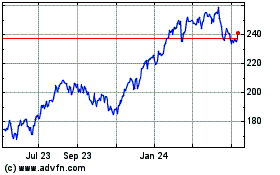Collapsed Skyscraper Deal Another Setback for Anbang
March 29 2017 - 1:16PM
Dow Jones News
By Esther Fung and Kane Wu
China's Anbang Insurance Group Co. has had a tough time pulling
off splashy U.S. real-estate deals since it scooped up the iconic
Waldorf Astoria Hotel in 2015.
On Wednesday, New York real-estate developer Kushner Cos. said
it had ceased talks with Anbang for a planned $7.5 billion
redevelopment of a mixed-use skyscraper in Manhattan.
That came almost exactly a year after the Chinese insurer made a
high-profile retreat from a bidding war to buy Starwood Hotels
& Resorts Worldwide Inc. The hotel chain went to Marriott
International Inc. for $13 billion.
The Beijing-based insurer, one of China's best-known overseas
investors, had shot to fame in the international deal-making
circuit with its $1.95 billion purchase of Manhattan's Waldorf
Astoria, at the time the steepest price ever paid for a U.S.
hotel.
Last year, Anbang made an abortive attempt to steal Starwood
from Marriott, sealing its reputation for flashy deal making. It
had partnered with New York financier Chris Flowers on the Starwood
bid. But Anbang pulled the bid after questions about its ownership
and political connections in China -- concerns that kept some Wall
Street banks from taking the insurer as a client -- and scrutiny
increased over the company at home.
A few weeks before the Starwood pullout, Anbang had inked an
agreement to buy Strategic Hotels & Resorts from Blackstone
Group LP in a deal valued at $6.5 billion.
Anbang's shareholders include a collection of 39 Chinese
companies, some of which at one point shared the same contact
address or legal representative and in turn are owned by other
companies, according to online corporate registry filings reviewed
by The Wall Street Journal. Anbang's chairman and founder, Wu
Xiaohui, is married to the granddaughter of former Chinese leader
Deng Xiaoping.
Since the aborted Starwood deal, Anbang has made lower-profile
property deals in Canada and Japan, according to data from
Dealogic.
For more than a year, Chinese regulators have intensified
controls over capital outflows and spend more time scrutinizing
potential deals that Chinese companies are making abroad.
But Chinese investors are still doing deals overseas. "When you
think about investing in China, there isn't so much to buy.
Properties aren't cheap," said Theo Cheng, Anbang's head of
overseas real-estate investment, at an industry conference in
France earlier this month. "There's a whole bunch of capital that
for different reasons needs to come out to diversify and seek
better returns."
Mr. Wu, who has hobnobbed with former U.S. Secretary of State
Henry Kissinger and Stephen Schwarzman, the billionaire chief
executive of Blackstone Group, said in a dinner gala earlier this
year that friendships built at a personal level between business
partners help improve ties between China and the U.S.
This time, Anbang had been in talks to provide as much as half
of the $2.5 billion in equity for the planned redevelopment of 666
Fifth Avenue, according to people close to the negotiations. A
Kushner Cos. spokesman added that the firm remains in active
negotiations with other potential investors for the project.
The disclosure about ending talks with Anbang came after
lawmakers and ethics experts last week expressed concerns about the
potential for a conflict of interest. Jared Kushner, son of the
real-estate company's founder, Charles, is the son-in-law of
President Donald Trump and occupies a key advisory position in the
administration.
The younger Mr. Kushner has taken steps to protect against
potential conflicts. For example, he has sold his personal stake in
666 Fifth Ave. and dozens of other properties to a trust controlled
by other family members. But some ethics experts have said the
measures have fallen short, and members of Congress expressed
concerns over the Anbang talks.
--Phred Dvorak and Peter Grant contributed to this article.
Write to Esther Fung at esther.fung@wsj.com and Kane Wu at
Kane.Wu@wsj.com
(END) Dow Jones Newswires
March 29, 2017 13:01 ET (17:01 GMT)
Copyright (c) 2017 Dow Jones & Company, Inc.
Marriott (NASDAQ:MAR)
Historical Stock Chart
From Mar 2024 to Apr 2024

Marriott (NASDAQ:MAR)
Historical Stock Chart
From Apr 2023 to Apr 2024
